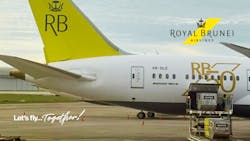Royal Brunei Airlines Joins Unilode’s Global ULD Pooling Network
Royal Brunei Airlines has partnered with Unilode Aviation Solutions to introduce unit load device (ULD) pooling across its global operations, marking a major step toward more efficient and sustainable ground and cargo handling.
Under the long-term agreement, Royal Brunei will transition from managing its own ULD fleet to joining Unilode’s global digitized pool, enabling more flexible, data-driven and cost-efficient operations for cargo and baggage handling. The move supports the airline’s broader strategy to improve operational performance, reduce waste and lower its carbon footprint.
By joining Unilode’s network, Royal Brunei gains access to the provider’s global MRO facilities, digital tracking technologies and 800-strong team of ULD specialists, ensuring improved service reliability and on-demand maintenance support at key airport locations. The arrangement is expected to reduce repositioning needs for damaged containers and cut logistics and repair costs.
Unilode’s sustainability-focused pooling model also provides real-time visibility and usage data, helping the airline track ULD utilization and measure progress in its decarbonization initiatives.
“Pooling provides a proven path to increase operational efficiency, reduce costs, increase flexibility, and make meaningful progress toward sustainability goals,” said Mohammed Akhlaq, Chief Commercial Officer at Unilode Aviation Solutions. “By joining our global ULD fleet, Royal Brunei Airlines will benefit from Unilode’s scale, ground expertise and continued investment in digital innovation.”
Badaruddin Hj Bagol, Chief Operations Officer at Royal Brunei Airlines, added that the partnership supports the carrier’s commitment to “responsible growth and operational excellence,” noting that the efficiency and environmental benefits of ULD pooling are “clear.”
The collaboration underscores the growing industry shift toward shared ULD management as a means of improving operational efficiency and reducing the environmental impact of ground operations.
